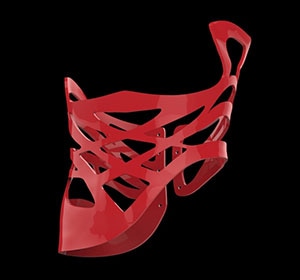Jan 3 2018
Today, gluing is preferred to connect components with each other instead of riveting, welding or using screws. That enables making planes, cars and agricultural machines lighter.
The requirements placed on this adhesive are high: it has to be sufficiently flexible in order to compensate for stress peaks in the joints, while continuing to provide a rigid connection in the surface. Fraunhofer researchers have presently developed an adhesive called “MetAK”, which can be soft and hard simultaneously.
 MetAK enables scoliosis corsets in new, modern designs with a high level of wearing comfort. (Photo credit: Fraunhofer LBF)
MetAK enables scoliosis corsets in new, modern designs with a high level of wearing comfort. (Photo credit: Fraunhofer LBF)
"MetAK is comparable to an ordinary two-component adhesive from the hardware store, only that more components are mixed together in ours" explains Dr. Roland Klein, a co-developer of MetAK from the Fraunhofer Institute for Structural Durability and System Reliability LBF, in Darmstadt, Germany. "The exact formula is a secret of ours." The production is considered to be simple, since the components do not have to be synthesized in an elaborate manner in the laboratory; they are commercially available.
Degrees of hardness are separately adjustable
It is possible to determine the stiffness of the initially viscous material based on synthetic resin, with the help of two hardening mechanisms that include irradiation with UV light and heat. "The areas that should remain flexible are not irradiated; they are instead treated with heat, which cures them. They combine optimally with the irradiated, fixed areas to form a network. Their consistency is then rubbery". This is perfect for dynamic loads, such as those that take place in the connection between a car engine and body. In this condition, the joining zones are specifically exposed to high stress peaks and vibrations – an issue that will have to be handled by bonded aircraft components, wind turbines or train.
MetAK has the advantage that the rigidity is very easily adjustable. You no longer need many different adhesives with different degrees of hardness; you can flexibly adjust the material to the frequency range of the vibrations and compensate for them.
Dr. Roland Klein, co-developer of MetAK
The material becomes harder when the irradiation with UV light is more intense and longer. Following the final heat treatment with a radiant heater or in the oven at 100 to 180 degrees (based on the application), MetAK is considered to be no longer deformable, and the chemical reaction is completed.
Suitable for orthopedic applications
Besides being used as an adhesive, MetAK can also be cast in a definite shape. It is then possible to use radiation and heat for producing soft and hard zones with flowing transitions – attractive for orthopedic applications, for instance. Tim Bastian Klaus, Klein’s colleague, is working on a MetAK corset capable of supporting the deformed spine of scoliosis patients but which at the same time reacts flexibly. This indeed would prevent aggravating painful pressure points and increase wearing comfort. Furthermore, MetAK brings about the possibility to develop these corsets in individual, modern designs along with a permeable structure, particularly for patients who are generally adolescents. This is a vital criteria that helps to determine the frequency of wear and thus, the success of the therapy. Along with design student Anja Lietzau, Klaus won the Fraunhofer Ideas Competition 2017 for his concept. "The material could also be used for other orthopedic applications, such as orthopedic shoes or prostheses," says Klaus.